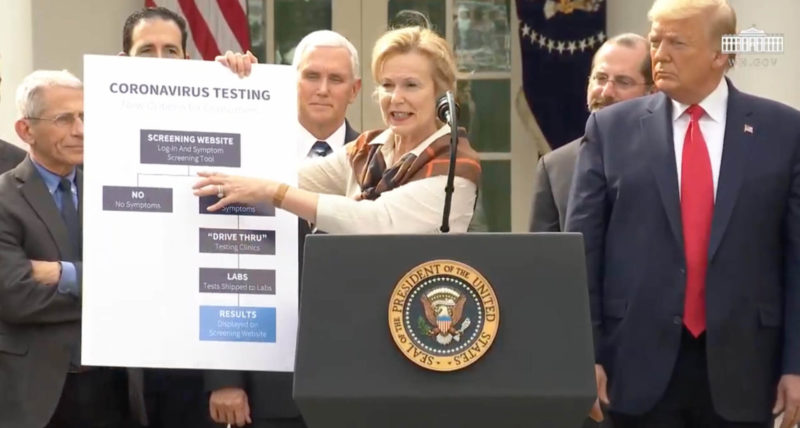Google helping to build pilot coronavirus testing website
Engineers are contributing to the project aimed at helping people find nearby drive-through COVID-19 testing sites.
The President of the United States announced during a press conference Friday that the White House is partnering with Google to build a website to help people find a coronavirus testing site. The site will give users a symptoms testing quiz and then if the site determines you should be tested, it will direct you to drive through COVID-19 testing clinics. Details have since emerged that this will be a pilot program from Alphabet life sciences company, Verily.
Being worked on now. President Donald Trump said that there are over 1,000 Google engineers working on this site. The goal seems to be to get this website up and running by Sunday night.
How the site will work. The White House showed this simple flow chart of the screening web site. It offers a login and symptom screening tool. If the user’s symptoms warrant visiting a drive-through testing center, the site will show them where and when to go there.

The testing facilities will be with Walgreens, CVS, Walmart, Target and others, the White House said.
It appeared from the site flow that the test results will be posted to users’ accounts on the site. It’s not clear how much data users will need to enter, how it will be stored and which organizations will have access to the sensitive health data.
Less than initially portrayed. About an hour after the press conference, Google posted a statement from its Alphabet sister company Verily on Twitter: “We are developing a tool to help triage individuals for Covid-19 testing. Verily is in the early stages of development, and planning to roll testing out in the Bay Area, with the hope of expanding more broadly over time.”
This is significantly less ambitious than what was conveyed during the press conference. Google’s involvement appears to be limited to lending engineering help to Verily.
Maybe not. Saturday at 8:45pm ET Google is now saying “We are fully aligned and continue to work with the US Government to contain the spread of COVID-19, inform citizens, and protect the health of our communities. Google is partnering with the US Government in developing a nationwide website that includes information about COVID-19 symptoms, risk and testing information. This is in addition to other measures we are taking, including: a Google “home page promotion” to promote greater awareness of simple measures citizens can take to prevent the spread of the disease; work being done by our sister company Verily to launch a pilot website that will enable individuals to do a risk assessment and be scheduled for testing at sites in the Bay Area; promoting authoritative information through Google Search and YouTube; taking measures to protect users from misinformation, including phishing, conspiracy theories, malware and misinformation; rolling out free access to our advanced Hangouts Meet video-conferencing capabilities to all G Suite and G Suite for Education customers globally until 7/01/20; advancing health research and science; and financially supporting global relief efforts.
This article has been updated with Google’s statement and additional details about the project.
Search Engine Land is owned by Semrush. We remain committed to providing high-quality coverage of marketing topics. Unless otherwise noted, this page’s content was written by either an employee or a paid contractor of Semrush Inc.


